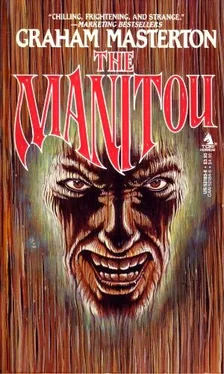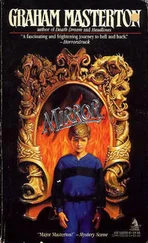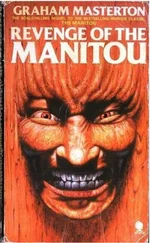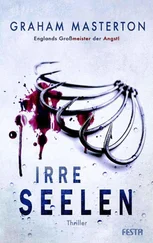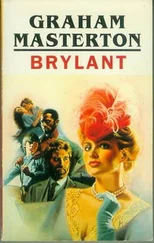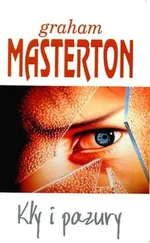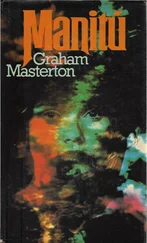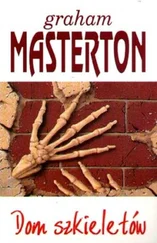"What do you want?" asked Amelia again. "What is it you're looking for?"
I could have been mistaken, but I thought I saw the black wooden lips move into a quiet and self-satisfied smile. The face stayed like that for a moment, and then the wood seemed to flow and bend, and the features melted away, and soon there was nothing there but the flat polished table.
The weird light faded, and we were back in darkness.
"Harry," said Amelia. "For God's sake put the lights on."
I let go of MacArthur's hand, and Mrs. Karmann's hand, and stood up. At that second, there was a shattering crack, and a brilliant white flash of light, and the windows smashed with a bomb-like explosion that sent glass spraying everywhere. The drapes flapped and billowed in the icy wind from the snowy night outside, and Mrs. Karmann screamed in terror.
I went to the lights and snapped them on. Everything in the dining room had been thrown around, as if a hurricane had come howling through. There were glasses and decanters on the floor, paintings were hanging askew, chairs were knocked over. The cherrywood dining table had split from one side to the other.
MacArthur stood up and came crunching across the carpet through the litter of glass. "I've had enough, man. From now on, it's social security plates for me, and nothing else."
"Harry," called Amelia. "Help me get Mrs. Karmann through to the living room."
Together we carried the old lady into the next room and laid her down on the settee. She was white and shivering, but she didn't seem to be hurt. I went over to the cocktail cabinet and poured her a large glass of brandy, and Amelia held it for her to sip.
"Is it all over?" she whimpered. "What happened?"
"I'm afraid there's a bit of damage, Mrs. Karmann," I told her. "The windows broke, and some of your glassware is smashed. I'm afraid the table's cracked too. But it's a clean split. Maybe you can get it repaired."
"But what was it?" she said. "That face !"
Amelia shook her head. MacArthur had found some cigarettes in a silver box, and he handed her one. She lit it with trembling hands, and blew the smoke out in a long unsteady stream.
"I don't know, Mrs. Karmann. I'm not that expert as a medium. But whatever it was, it was very powerful. Usually, a spirit has to do what you tell it to do. This one was just showing us that it didn't give a damn what we thought of it."
"But Amelia," I said. "Is that the thing that's been giving Karen Tandy all those nightmares?"
She nodded. "I think so. I mean, it's so strong that it must be causing some kind of vibrations in this apartment. And I expect that's what Karen picked up in her dreams. When you're asleep, you're very receptive to vibrations, even weak ones, and these are much more powerful than any I've ever come across. There's something here that's possessed of real magical strength."
I lit a cigarette myself and thought for a moment. "Did you say magical ?" I asked Amelia.
"Sure. Any spirit with that kind of control over itself would have to be the spirit of somebody who knew about the occult when they were alive. It might even be a person who's still living today, and is able to float around as a spirit when they're asleep. It has been known."
"Sounds like bullshit t'me," said MacArthur. "If I was Mrs. Karmann, I'd take that table back and complain."
I grinned. It was good to have a real skeptic around, even if he wasn't helping us much.
"Amelia," I said. "If you're saying that what we saw tonight was the spirit of someone magical, then there's an interesting tie-in. I was reading my Tarot cards the other evening, and I kept coming up with The Magician. No matter how I dealt or redealt them, I always ended up with the same card."
Amelia brushed her long brown hair away from her eyes. "In that case, I guess it's fair to suppose that whoever is doing this, whether they're alive or dead, is a magician. Or somebody like a magician."
"Witch doctor?" suggested MacArthur.
"Could be. I mean, he looked like some kind of African. Not just because the wood was black, but because of his lips, remember?"
Mrs. Karmann sat up, clutching her glass of brandy. "Well, I'll tell you what he reminded me of," she said weakly. "He reminded me of a cigar-store Indian."
MacArthur snapped his fingers. "That's it — Indian. The hooked nose, right, and the lips, and the high cheekbones. He's not a witch doctor, he's a medicine man!"
Amelia brightened up. "Listen," she said. "I have quite a few books on Indians. Why don't we go back to my place and see what we can find out about medicine men? Mrs. Karmann, do you think you'll be all right now?"
"Oh, you go ahead," said the old lady. "I'll stay across the hall with my neighbor Mrs. Routledge, and Karen's parents will be here later. If you think that any of this can help poor Karen, then the sooner you get going the better."
"Mrs. Karmann," said Amelia, "you're an angel."
"Not yet a while, I hope," smiled Mrs. Karmann. "Not yet a while."
Back in the untidy jumble of Amelia's apartment in the Village, surrounded by books and magazines and tapestries and pictures and old hats and half a bicycle, we went through a dozen volumes on Indian lore. Surprisingly, there wasn't much about medicine men, apart from stuff on buffalo magic and rain dances and battle spells. Out of the eleven books, nothing gave us any clues about the wooden death mask on Mrs. Karmann's table.
"Maybe we're totally mistaken," said Amelia. "Perhaps the spirit is somebody living today. I mean, a hooked nose doesn't have to be Indian. It could be Jewish."
"Wait a minute," I told her. "Have you any other history books, or anything at all that might contain a cross reference to Indians or medicine men?"
Amelia scuffled through a couple of heaps of books, and came up with a history of early settlements in the United States, and the first volume of a three-volume study of New York. I went to the indexes and looked up Indians. The book on early settlements contained nothing more than the usual generalizations about Indian civilization. In those early days people were more in the mood for land-grabbing than studying the indigenous culture of the natives. But the book on New York had an illustration which gave me the biggest break I'd had since I'd found Karen Tandy's nightmare ship in the library.
I'd seen the drawing before — in school books and history books — but it was only when I came across it that night in Amelia Crusoe's apartment that I realized just what its implications were. It was a sketchy engraving of the tip of an island. On the shore was a small cluster of houses, windmill, and a high-walled fort in the shape of a cross of Lorraine. There were ships standing offshore, and canoes and jolly-boats paddling around in the foreground.
The largest of the ships were identical to Karen Tandy's nightmare vessel and the picture's caption bore the connection out. It read: "Earliest known view of New Amsterdam, 1651. The director-general of the Dutch West India Company lived in this small but important settlement."
I passed the book over to Amelia. "Look at this," I said. "This is the exact ship that Karen Tandy dreamed about — and look, there are half a dozen Indians in that canoe. This is what New York was like, three hundred and twenty years ago."
She studied the picture carefully. "Harry," she said, "this could be it. This could be just what we're looking for. Supposing there was an Indian medicine man in New York, or New Amsterdam, all those centuries ago, and supposing that Karen actually picked up his vibrations in the same place that he once used to live."
"That's right," put in MacArthur, scratching his beard. "There musta been an Indian village on
East Eighty-second Street
Читать дальше
